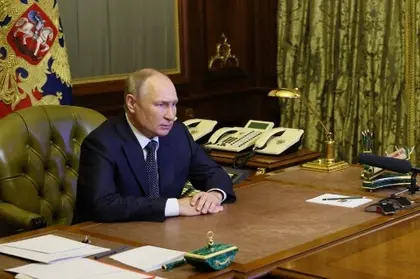Russian forces launched a barrage of fatal bombardments across Ukraine early on Monday, Oct.10 and President Vladimir Putin vowed even more “severe” retaliation against Kyiv.
The biggest wave of strikes across Ukraine in months killed at least 11 people nationwide and was apparent retaliation for an explosion this weekend that damaged a key bridge linking Russia to the Moscow-annexed Crimean peninsula.
JOIN US ON TELEGRAM
Follow our coverage of the war on the @Kyivpost_official.
The Ukrainian military said Russian forces had fired more than 80 missiles on cities across the country and that Russia had also used Iranian drones launched from neighbouring Belarus.
“Let there be no doubt,” Putin said in televised comments addressed to his security council, “if attempts at terrorist attacks continue, the response from Russia will be severe.”
Putin’s predecessor, Dmitry Medvedev, warned on social media that the strikes — which disrupted water and electricity services across Ukraine — were only “the first episode”.
“We were sleeping when we heard the first explosion. We woke up, went to check and then the second explosion came,” Ksenia Ryazantseva, a 39-year-old language teacher, told AFP.
“We saw the smoke, then the cars, and then we realised we didn’t have a window anymore,” she added.
“There’s no military target or anything like that here. They’re just killing civilians”.

ISW Russian Offensive Campaign Assessment, December 24, 2024
‘Demonstration of weakness’
Ukrainian President Volodymyr Zelensky said the Russian strikes had aimed to take down Ukrainian energy infrastructure. Regional officials across the country confirmed widespread disruptions to services.
Russia’s defence ministry meanwhile confirmed it had targeted Ukrainian energy, military command and communications facilities, claiming the strikes had been a success and “achieved their aims”.
Ukraine’s foreign minister said the attacks had not been “provoked” and the onslaught was Moscow’s response to a series of embarrassing military losses in eastern Ukraine.
“Putin is desperate because of battlefield defeats and uses missile terror to try to change the pace of war in his favour,” minister Dmytro Kuleba wrote on social media.
UK Foreign Secretary James Cleverly said the Russian missile strikes on the Ukrainian capital, Kyiv, and other cities were “unacceptable”.
“This is a demonstration of weakness by Putin, not strength,” he tweeted, adding that he had contacted Kuleba.
Zelensky said on social media meanwhile that he had spoken with the leaders of France and Germany and urged them to “increase pressure” on Russia.
Dozens injured
In Kyiv, the national police service said that at least 11 people had been killed and at least another 64 wounded.
Ukrainian officials said the central Shevkenko district of the city was hit and that a university, museums and the philharmonic building had been damaged.
An AFP journalist in Kyiv saw a projectile land near a playground and smoke rising from a large crater at the impact site.
Several trees and benches nearby were charred by the blast and a number of ambulances were at the scene.
“If there is no urgent need, it’s better not to go to the city today,” Kyiv mayor Vitali Klitschko said.
In the western city of Lviv, mayor Andriy Sadovyi said there were disruptions to electricity and hot water services after bombardments that targeted critical infrastructure, including energy facilities.
AFP photographers there said plumes of black smoke could be seen rising above the town’s skyline.
Moldova, a pro-democracy former Soviet republic, said several Russian cruise missiles targeting Ukraine had crossed its airspace, and it had summoned Moscow’s envoy to demand an explanation.
“Our thoughts are with the victims of the brutal strikes,” Moldovan Foreign Minister Nicu Popescu said on Twitter.
Moldova, which is a candidate to join the European Union, has a small breakaway region, Transnistria, which is armed and supported by Russia.
Crimean bridge attack
Belarusian President Alexander Lukashenko, a close ally of Putin’s, meanwhile claimed on Monday that Ukraine was preparing an attack on his country’s territory.
He said Russia and Belarus would “deploy” troops together, without specifying where.
The autocratic leader also accused Ukraine, alongside neighbouring Poland and Lithuania, of training Belarusian militants to carrying out attacks at home.
The strikes across Ukraine came a day after Moscow blamed Kyiv for the blast that damaged a bridge linking Crimea to Russia, leaving three people dead.
“The authors, perpetrators and sponsors are the Ukrainian secret services,” Putin said of Saturday’s bridge bombing, which he described as a “terrorist act”.
The blast that hit the bridge sparked celebrations by Ukrainians and others on social media.
But Zelensky, in his nightly address on Saturday, did not directly mention the incident, and officials in Kyiv have made no direct claim of responsibility.
On Saturday, Russia said some road and rail traffic had resumed over the strategic link, a symbol of the Kremlin’s 2014 annexation of Crimea.
The 19-kilometre (12-mile) bridge is also a vital supply link between Russia and the annexed Crimean peninsula.
Some military analysts argue that the explosion could have a major impact if Moscow sees the need to shift already hard-pressed troops to Crimea from other regions — or if it prompts a rush by residents to leave.
You can also highlight the text and press Ctrl + Enter






